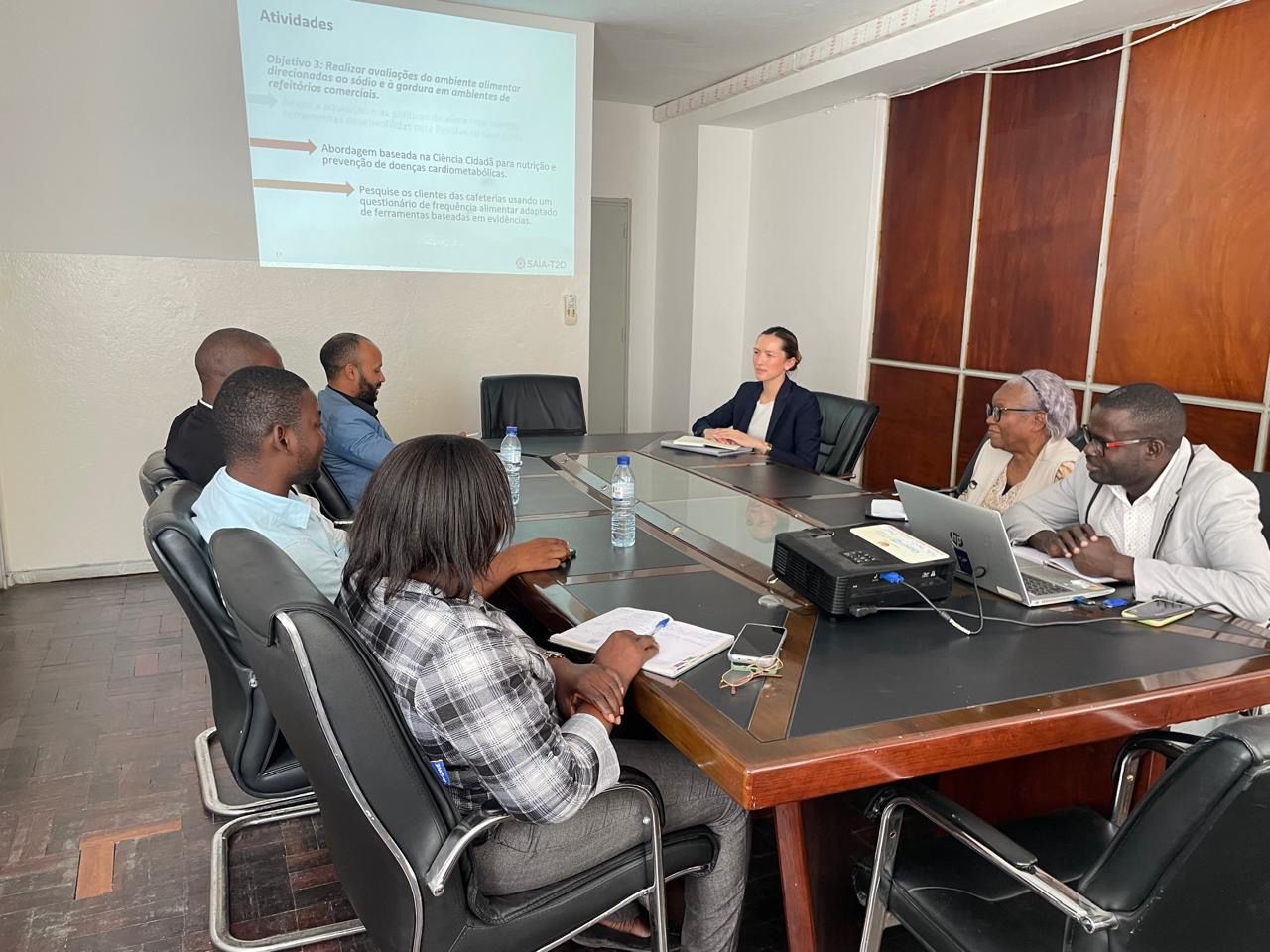
The prevalence of diabetes is growing worldwide, especially in low- and middle-income countries that already experience a serious burden of infectious diseases. Diabetes is one of many noncommunicable diseases — illnesses that can’t be transferred between people — causing premature deaths globally. But health care systems in these countries are not equipped to address increasing rates of diabetes. Decades of funding to combat infectious diseases like TB and HIV have led to siloed health care systems where providers may be expertly trained to treat these diseases, but not have the tools to provide diabetes care.
Understanding how to support health care systems in these countries to improve diabetes diagnosis, treatment and prevention is a question Amanda Brumwell has been researching. Brumwell is a doctoral student at the University of Washington School of Public Health, and her focus on implementation science in global health means she wants to take what is already known about how to prevent and treat diabetes and make it useful to communities.
While diabetes doesn’t receive as much funding support internationally as infectious diseases, the global burden of diabetes is massive: One in 10 adults worldwide have Type 2 diabetes. The impacts can be devastating to individuals, communities and health care systems, as diabetes can lead to health problems like eye damage, blindness, cardiovascular issues that could necessitate amputation, and stroke.
“By targeting diabetes, you’re able to help prevent other public health challenges and forms of suffering that are avoidable,” Brumwell said. “In my research I want to build on the past and present priorities that have created siloed systems to treat TB and HIV. I want to understand how these siloed systems can be leveraged so that diabetes and chronic disease care can be more accessible to patients and more efficient for providers.”

Brumwell was recently named one of seven Magnuson Scholars across the UW Health Science schools for her diabetes research. Scholars are selected for their academic performance and potential contributions to research in the health sciences. All Magnuson Scholars help continue the legacy of the late Senator Warren G. Magnuson and his remarkable commitment to improving the nation’s health through biomedical research, education, and responsive, sustainable health care discoveries.
Solutions through implementation science
One of the first things Brumwell learned in her implementation science classes at the UW was that it takes on average 17 years for a new piece of evidence or practice to make its way into a health care setting. This time gap between putting research into practice is something the Global Health Metrics and Implementation Science PhD program has been trying to address. It was the first doctoral program of its kind in the country that provides students with innovative tools to advance global health solutions. This doctoral program provides an interdisciplinary framework that addresses how interventions can be scaled-up with greater speed, fidelity, efficiency, quality, and coverage.
Brumwell wants to apply what we already know about prevention and treatment for diabetes in communities that are most impacted by this disease.
“Implementation science gives us a lot of optimism,” she said. “If you are able to make those solutions work on a broader scale more quickly and effectively, you are preventing so much unnecessary harm. We know what works. Next, we need to make these practices work in different settings.”
Before beginning her Ph.D. program, Brumwell spent years working for public health organizations in India, South Africa and on the US-Mexico border where she observed challenges to implementing solutions to health care problems. She saw how best practices in high-income settings — like testing for TB using the most sensitive assays, or preventing TB using short-course regimens — were not part of routine care in lower-resource settings, because these practices can be too expensive, health care providers don't have training or else these practices aren't reflected in national guidelines or strategies for combatting disease.
“I felt that a Ph.D. in implementation science would give me tools to systematically improve the delivery of care in the places where I was working,” she said.

During her time working to improve TB care, she supported the implementation of projects that integrated TB and diabetes care. These two diseases are often co-morbid; they frequently appear simultaneously in people. That provides a challenge for health care providers, who need to both treat an infectious disease which exists for only a finite amount of time alongside a chronic disease that will be with a person for the rest of their life. So as Brumwell worked with providers, programs and policies related to TB and diabetes, Brumwell realized she needed to learn more about how to care for these diseases simultaneously.
“As someone with more experience in TB programs, but who was increasingly working on programs that dealt with more than TB, I became increasingly aware of the gaps in my knowledge,” Brumwell said. “I needed to learn about the separate stream of care for diabetes to be most effective at my job."
Integrating diabetes care into health systems
At the UW, Brumwell joined an implementation science and health systems strengthening project in Mozambique that focuses on improving diabetes care.
The project is called Systems Analysis and Improvement Approach for Type II Diabetes (SAIA-T2D), and is led by UW faculty Sarah Gimbel, Kenneth Sherr and Ana Olga Mocumbi. It improves the delivery of diabetes care through systems engineering tools, such as continuous quality improvement, cascade analysis and process mapping. The goal is to help health care providers use data collected from patients to identify gaps or breakages in the continuity of care. After identifying these gaps, providers are supported in implementing micro interventions, which they then track to see how those small changes can make an impact over time with their patients.
“It seems intuitive but it’s quite novel because care providers infrequently have access to — or the time to review — system-level data that allows them to understand patterns in the cascade of care,” Brumwell said. “It’s really exciting to be able to work with these frontline care providers and facilitate knowledge transfer and sharing of the data that they are already generating to improve delivery of care.”

In addition to implementing a health-systems approach for improving diabetes treatment and diagnosis, the SAIA-T2D project is also piloting two novel strategies to prevent diabetes, another facet of diabetes care that has been neglected.
First, the project plans to gather research around pre-diabetes diagnosis, care, and prevalence, the data for which is largely absent in sub-Saharan African settings. Second, the project will pilot a food environment assessment and questionnaire to understand the kinds of food that people have access to and consume, and which may be associated with noncommunicable diseases like diabetes. Brumwell hopes that her research in this area will fill a critical gap in knowledge regarding diabetes prevention. Characterizing the burden of pre-diabetes is important to understand who is affected and how future projects can best serve these populations, whereas studying food systems will help researchers and policymakers alike understand how to mitigate the risk of noncommunicable disease.
“This work is unique and potentially so impactful because it is a two-prong approach that addresses both diagnosis and care for existing diabetic patients and education and care seeking for pre-diabetic patients,” said Gimbel, professor of nursing and global health. “Because of the substantial cost and resource implications of treating Type 2 diabetes in low resource settings like Mozambique, it is essential to also address the needs of patients in the pre-diabetic phase to effectively meet population needs.”
Brumwell is also studying what evidence and strategies exist for integrating diabetes care into health care systems that are currently focused on infectious disease care for TB or HIV. Projects Brumwell is working on are starting to show promise in this area. They have generated preliminary evidence that diagnosis and treatment for chronic diseases can effectively be integrated into care patients are currently receiving for other health issues. Brumwell hopes that in the long term, these findings can inform diabetes policy in places where chronic disease has not been a priority.
“Providers I encountered in Mozambique have been championing better diabetes approaches, so it’s exciting that I can work with teams that build on their work and advocacy,” Brumwell said. “There’s an appetite and need to prioritize more noncommunicable chronic disease care.”